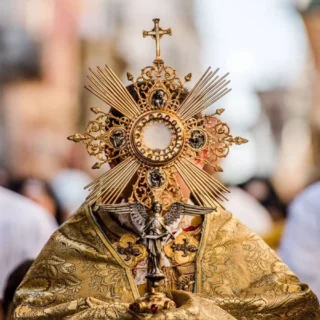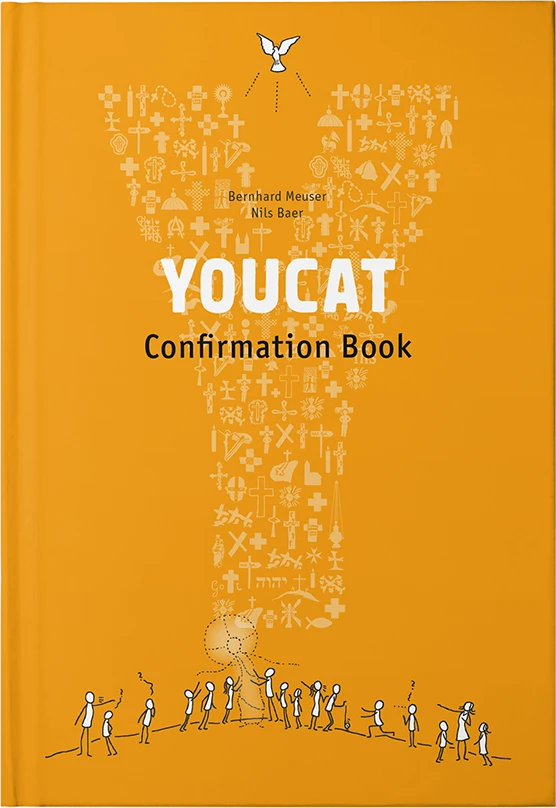

Credopedia
Lust
To demand something – and to demand it strongly – belongs to man.
What is that?
To demand something – and to demand it strongly – belongs to man. God has created him in such a way that he has basic needs (to want to live, to become full, to multiply), to which powerful pre-rational drives correspond: the power drive, the self-preservation drive, the sexual drive. The Ninth of the Ten Commandments, it is said in YOUCAT 462: “The Ninth Commandment forbids, not desires per se, but rather disordered desires. The “covetousness” against which Sacred Scripture warns is the rule of impulses over the mind, the dominion of urges over the whole person, and the sinfulness that causes“. The erotic attraction between man and woman, says YOUCAT 462: “…was created by God and is therefore good; it is part of a person’s sexual nature and biological constitution. It ensures that man and woman can unite with one another and descendants can spring from their love.“. The Latin word concupiscence (for evil desire) refers to the disintegration of the natural driving forces, the resistance to goodness and man’s continuing inclination to evil, which remains with man even after his baptism. “Covetousness leads to greed, avarice, theft, robbery and fraud, violence and injustice, envy and immoderate desires to own what belongs to others.” (YOUCAT 465)
What does the Holy Bible say?
The Ninth and Tenth Commandments are dedicated to wrong wishing: “You shall not covet your neighbour’s house. You shall not covet your neighbour’s wife, his male or female slave, his ox or donkey, or anything that belongs to your neighbour.” (Exo 20,17) In the New Testament, the domination of lust over man is basically overcome – 2 Peter 1,3 speaks of the “His divine power has bestowed on us everything that makes for life and devotion, through the knowledge of him who called us by his own glory and power.” (Titus 2, 11-12) –, because giving oneself over to the dominion of false desires and lusts is considered the mark of an outmoded way of life; so Paul urges in Eph. 4, 22-25: “…that you should put away the old self of your former way of life, corrupted through deceitful desires, and be renewed in the spirit of your minds, and put on* the new self, created in God’s way in righteousness and holiness of truth. Therefore, putting away falsehood, speak the truth, each one to his neighbour, for we are members one of another.”
A short YOUCAT-Catechesis
The abysses are habitable
When my soul was quite a battleground, I visited the monks in Taizé. The little village in Burgundy, France, is a wonderful place to come to rest, to pray, to read in the Scriptures. And, of course, I had come (like thousands of others) because of it – because of the legendary Brother Roger Schutz. People went to Taizé at that time to hear him and to receive instruction from the depths of divine presence. It was a few years before the elderly Prior of the community was murdered in the summer of 2005. We were not disappointed. What the old man drew from the silence was exciting. I can no longer reproduce the words but later found them again in one of his books. It was about the chaos in me, the wild cross shots in my soul, with which I believed to be alone in the world. But there I was to be mistaken. Brother Roger spoke about a reality “in each one of us”.
How? In each one of us?
Brother Roger told us: “In each one of us there are abysses, unknowns, doubts, wild passions, secret sorrows, … but also feelings of guilt, never admitted, so much so that immense voids open up for us. Urges stir us up, one doesn’t know where they come from – primordial memories or genetic determination?” Until then, it was the admission that the man in whom we saw a kind of saint was familiar with the abysses behind the eyes, with wild desire, mental chaos, cross shots and inner emptiness. But the wise monk-father did not stop there. He gave us a promise: “If we let Christ pray in us with childlike trust, one day the abysses will be inhabitable. One day, later on, we will find that a revolution has taken place within us.” Let me translate: don’t pray! Let Christ pray in you! Do not desire! Let Christ in you desire! Do not seek! Let Christ search in you! And that says it all, really.
Buddhist and Christian Desire
In the 20th century, a fascinating encounter took place in various places in Europe, Asia and America: for the first time in the history of the two religions, Christian and Buddhist monks spent a certain amount of time living together, praying and learning from each other. In the process, they also talked about ZEN and “not coveting.” This striking injunction exists in Buddhism as well as in Christianity. Christians know it from the Ten Commandments: “You shall not covet your neighbor’s wife … your neighbor’s goods and chattels. Let’s take a text from Taoist Buddhism for comparison: Bodhidharma, a 6th century master, teaches: “Wherever there is desire, you find suffering; when desire ceases, you are free from suffering. Non-desire is the way to truth. Therefore I say to you: Be without desire!”
In his classic “Being and Having” (1976), the social philosopher and psychoanalyst Erich Fromm (1900-1980) also noted this agreement. Buddhism and Christianity unite in protest against human practices that promise happiness through “having” – and not through “being.” “Greed,” says Erich Fromm, “is always the result of an inner emptiness.” People who live in the have mode fall prey to greed; they are only something if they possess as much as possible; they define themselves by the quantity and splendor of the objects that surround them; they say, “I am what I have.” The greedy person has love only for the dead; he cannot love the living. He cannot leave the beautiful flower standing; he must destroy it in order to possess it. Therefore, he plunders, robs, conquers and kills. In the end, he has everything and is nothing. The greed for dead things must be extended today by looking at the greed for the dead images that we encounter in pornography. Here, too, one can have everything and get nothing. What is called for are mirages. The person in the flesh, for whom one longs – is an electronic bluff. The “you” is the monitor that offers the objects of desire in limitless variety. No human encounter takes place. Concupiscence, false desire, brings a satisfaction that robs peace. It only feeds hunger and accumulates treasures that do not exist. And here, too, what applies to the addiction to dead things: “You fool!” says the God of the Christians, “this night your life will be demanded of you; and the things you have prepared, to whom will they belong? Thus will it be for the one who stores up treasure for himself but is not rich in what matters to God.” (Luke 12, 20-21). Master Bodhidharma would now recommend, “Non-demand is the way to truth.” An intersection with the biblical: “You shall not covet… .” (Dtn 5,21).
A deceptive consensus
The agreement is deceptive; it is a consensus on the surface. Buddhism and Christianity come to the same conclusion for diametrically opposed reasons. The Buddhist is not to desire because the fullness of things is fallacy. He is not to covet so that life will not continue to go into overdrive. “All of life is suffering,” is the first sentence from the Buddha’s “four noble truths.” Overcoming suffering happens in overcoming greed, in rejecting our desires, in seeing through them as lies, in saying no. For Buddhists, therefore, it is wise to break the habit of desiring to become happy without desires. A very pessimistic message! The “not desiring!” of a Christian has completely different reasons.
Christians assume that everything God has created is good. Things are tempting because on them still rests the splendour and reflection of divine creativity: “Beautiful are the flowers, more beautiful are the people…”, says an old hymn. We are to rejoice in all that is created, but we are not to make the reflection an idol. Paul recommends “having” as if we did not have, ”those buying as not owning, those using the world as not using it fully.” (1 Cor 7, 30-31). Why? Because man is destined for an excess of fulfilment and should not give away his desires to objects that are too small to truly satisfy him.
Desireless and happy
And what about the void that opens up once we understand that we can still throw so many balance sheet titles, university degrees, supermen/premium women, travel highlights and luxury SUVs into the gaping hole of our longing without even coming close to filling it? The image of the chasms within us that will one day “be inhabitable” had Brother Roger associated with the name of Christ praying in us, calling out in us for the “Abba.” Only God makes one happy without desire.
To desire something – and to desire it strongly – belongs to man. God created him that way. He must not waste his desire on the worthless: He is to have a void for God. To value and desire the good wherever it appears leads us only to the Good who is worth everything, the priceless God who cannot be bought. In the same breath with the demand of “not coveting!” one must therefore always remember Therese of Lisieux’s (1873-1897) outrageously provocative sentence: “We can never expect too much from God; We get from him as much as we hope for.”

YOUCAT Digital
Discover our digital products, which will help you to grow in faith and become missionaries yourself.






